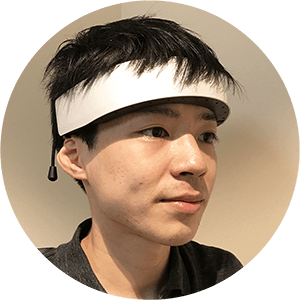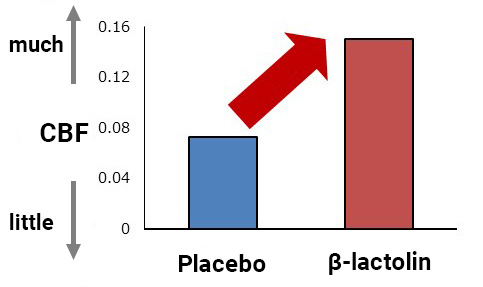[Health Science domain]
World First: Research Reveals Milk-derived β-lactopeptides Improve Cerebral Blood Flow in the Middle-aged As Well As Elderly
- Research and Technology
July 2, 2021
Kirin Holdings Company, Limited
Kyowa Hakko Bio Co., Ltd.
Mechanism by which milk-derived β-lactopeptides improve cerebral blood flow clarified
Successful visualization of improved cerebral blood flow using a small wearable device
New possibilities for β-lactopeptide usage
TOKYO, Friday July 2, 2021 – Kirin Holdings Company, Limited’s (Kirin Holdings) Kirin Central Research Institute, in a joint study has demonstrated for the first time ever*1 in a clinical trial that the GTWY peptide*3, a type of milk-derived β-lactopeptide*2, improves cerebral blood flow (CBF) in the prefrontal cortex, which otherwise declines with age. The clinical trial was implemented under the supervision of Dr. Ryuta Kawashima, Professor at the Institute of Development, Aging and Cancer, Tohoku University, and Chief Technology Officer of NeU Corporation.
Kirin Holdings has also succeeded in visualizing the CBF-improving effect using a small wearable CBF measurement device*5 (wearable device shown below) equipped with optical topography technology*4. Kirin Holdings will present the research results at the 10th annual meeting of the Japan Society for Dementia Prevention (June 24 to 26). At a symposium to be held as part of the meeting, Kirin Holdings will also present its initiatives from its KIRIN Brain Research function in collaboration with the Study Group on the Effect of Food on Cognitive Function (led by Dr. Yasuyoshi Ouchi of Toranomon Hospital in Tokyo).
*1 The world’s first discovery of a whey protein-derived peptide according to Kirin Holdings’ research (based on publicly available information as of June 10, 2021)
*2 A general term for peptides that have the effect of improving cognitive function. These peptides contain the amino acid sequence tryptophan-tyrosine (WY) and are derived from whey protein.
*3 GTWY is a key component of β-lactopeptides and a tetrapeptide with a sequence of four amino acids called glycine-threonine-tryptophan-tyrosine.
*4 Optical topography technology is a technology that uses weak near-infrared light to scan and visualize parts of the cerebral cortex with minimal physical stress. Compared to other brain function measurement technologies such as electroencephalography and magnetic resonance imaging, this technology allows for the measurement of brain activity in an environment closer to daily life.
*5 A wearable, portable brain activity measurement device equipped with two-channel (2CH) optical topography technology. A lightweight and comfortable-to-wear device specifically designed to allow for easy measurement of CBF. Compatible with smartphones and tablets for real-time wireless measurement.
Background to the research
In Japan’s rapidly-aging society, in which one in four people is elderly,*6 dementia and cognitive decline due to aging are huge social issues. Since dementia is thought to be caused by changes in the brain with aging, attention is being focused on early prevention through actions taken in daily life, such as by improving dietary habits. In recent years, epidemiological research on the Japanese population has found that the consumption of milk and dairy products reduces the risk of dementia and impaired cognitive function.*7
*6 Cabinet Office, Japanese government, White Paper on the Aging Society, FY 2020
*7 Ozawa M, et al, Journal of the American Geriatrics Society, 2014, 62(7): 1224-1230
As a result of Kirin Holdings’ long years of brain research in collaboration with the University of Tokyo and Kyowa Kirin Co., Ltd., Kirin Holdings has discovered that β-lactopeptides abundantly found in fermented dairy products such as camembert cheese, improve cognitive function.*8 Kirin Holdings has also demonstrated, in collaborative clinical trials with Keio University, that GTWY peptide, among other β-lactopeptides, improves memory and attention.*9 Although data suggested the involvement of the brain’s prefrontal cortex in these effects, the exact mechanism remained to be elucidated.
*8 Ano Y, Nakayama H, et al., Neurobiology of Aging, 2018, 72: 23-31
*9 Kita M, Ano Y, et al., Frontiers in Neuroscience, 2019, 13: 399
To elucidate the mechanism, the company focused on CBF. CBF carries oxygen, nutrients, and other energy sources to the brain, and therefore is essential for the normal functioning of the brain. Age-related decline in cognitive function is thought to be caused by a decrease in CBF. The company conducted this research based on the hypothesis that GTWY peptide could increase CBF.
-

A 2-channel, wearable, portable brain activity measurement device
Outline of the research
A randomized, double-blind controlled trial was carried out on 50 middle-aged to elderly healthy participants*10 to verify the effect of supplementation with GTWY peptide on human CBF. The participants’ CBF during loading tasks was measured using a 34CH CBF measurement device (optical topography device). The GTWY peptide intake group showed a significant increase in the magnitude of change in CBF in the dorsolateral prefrontal cortex compared with the placebo group. These results elucidated part of the mechanism by which GTWY peptide enhances memory and concentration.
In a separate clinical trial, 114 middle-aged to elderly healthy participants were included and took a supplement containing GTWY peptide. The results demonstrated that CBF during cognitive tasks, as measured with a 2CH wearable device (Fig. 2), was significantly increased in the GTWY peptide intake group compared with the placebo group. In this trial, the company succeeded for the first time in detecting an improvement in CBF using a wearable device with the abovementioned specification.
*10 A method of testing used in clinical trials in which participants are randomly divided into placebo and active drug groups, and are not told which group they are in until the trial is complete.
Trial methodology
1) A double-blind trial was conducted in which 50 healthy, middle-aged to elderly (between 45 and 64) men and women were randomly assigned to take either GTWY peptide or placebo. The participants’ CBF during cognitive tasks was measured at weeks 0 and 6, using a 34CH optical topography device.
2) A double-blind trial was conducted in which 114 healthy men and women (between 50 and 75) who were aware of forgetfulness (but without dementia) were randomly assigned to take either GTWY peptide or placebo. The participants’ CBF during cognitive tasks was measured at week 6, using a 2CH optical topography device.
Trial results
1) The results of the trial using a 34CH optical topography device demonstrated that the GTWY peptide intake group showed a significantly greater change from week 0 in CBF in the dorsolateral prefrontal cortex during a working memory task at week 6, compared with the placebo group (Fig. 1).
2) The results of the trial using a 2CH optical topography device also demonstrated that after 6 weeks of GTWY peptide intake, CBF in the dorsolateral prefrontal cortex was significantly higher than that in the placebo group (Fig. 2).
The results of these two studies were published in international journals Aging (Albany NY)*11and Journal of Clinical Medicine.*12
*11 Ano Y, et al., β-lactolin increases cerebral blood flow in dorsolateral prefrontal cortex in healthy adults: a randomized controlled trial, Aging (Albany NY). 2020 Sep 29;12(18):18660-18675.
*12 Ano Y, er al., Effects of β-Lactolin on Regional Cerebral Blood Flow within the Dorsolateral Prefrontal Cortex during Working Memory Task in Healthy Adults: A Randomized Controlled Trial, J Clin Med. 2021 Jan 28;10(3):480.
-

Figure 1. Results of CBF measurement using a 34CH optical topography device.
Measurements of CBF during a spatial cognitive task before and after intervention. The β-lactolin (GTWY peptide) intake group showed a significantly greater change in CBF in the dorsolateral prefrontal cortex compared with the placebo group (q = 0.045). Bars are mean ± S.E. (placebo group; N = 25, β-lactolin group; N = 24)
-

Figure 2. Results of CBF measurement using a 2CH optical topography device.
Measurements of CBF during a 2-back task after intervention. The β-lactolin (GTWY peptide) intake group showed a significantly greater change in CBF in the dorsolateral prefrontal cortex compared with the placebo group (p = 0.027). (placebo group; N = 45, β-lactolin group; N = 47)
Future developments
Going forward, based on the demonstrated effect of the GTWY peptide on improving CBF and the successful visualization of this effect with a wearable device, Kirin Holdings will advance initiatives to support brain health through collaboration with universities and municipalities.
Comment from Dr. Ryuta Kawashima (co-presenter):
Dr. Ryuta Kawashima summarized the importance of the discovery: “Improving blood flow in the brain is one of the essential factors in maintaining cognitive function. The current clinical trial has revealed part of the mechanism by which β-lactopeptides improve CBF and enhance memory and concentration. In a super-aging society, the role of dietary habits in maintaining cognitive function is expected to increase further.
It is also our great pleasure to see that the CBF-improving effect of β-lactopeptides could be easily visualized by NeU's wearable CBF measurement device. We hope that this initiative will be accelerated to make brain health support more accessible to society.”
Kirin Brain Research
Japan’s average life expectancy has been increasing and the country has entered a super-aged society. Given that an estimated one in five elderly people will suffer from dementia in 2025,*13 healthy life extension is a social issue. The Kirin Group understands that the joys and concerns in a daily life are intimately associated with brain activity, and thus launched KIRIN Brain Research to develop the new solutions mainly in health science to promote brain health and create joy.
Kirin Brain Research based on Kirin’s distinct technology and ways of thinking contributes to promote brain health in an effort to help resolve social issues and will create a society conductive to psychologically prosperous living, where everyone has confidence and ambition and feels free to experience their emotions.
*13 Grants in Aid for Scientific Research, MHLW Special Research Project, Research on Future Trends in the Prevalence of Dementia among Elderly People in Japan, 2014, Report on General & Specialized Research, 2015
Overview:
| 1. Name of presentation: | Supplementation with milk-derived beta-lactolin increases cerebral blood flow in the dorsolateral prefrontal cortex |
|---|---|
| 2. Name of academic meeting: | The 10th Annual Meeting of the Japan Society for Dementia Prevention |
| 3. Date of presentation: | Thursday, June 24 to Saturday, June 26, 2021 |
| 4. Presented by: | Yasuhisa Ano and Keiko Kobayashi from Kirin Central Research Institute, Research and Development Division, Kirin Holdings Company, Limited Ryuta Kawashima, Institute of Development, Aging and Cancer, Tohoku University; NeU Corporation |
About Kirin Holdings
Kirin Holdings Company, Limited is an international company that operates in the Food & Beverages domain (Food & Beverages businesses), Pharmaceuticals domain (Pharmaceuticals businesses), and Health Science domain (Health Science business), both in Japan and across the globe.
Kirin Holdings can trace its roots to Japan Brewery which was established in 1885. Japan Brewery became Kirin Brewery in 1907. Since then, the company expanded its business with fermentation and biotechnology as its core technologies, and entered the pharmaceutical business in the 1980s, all of which continue to be global growth centers. In 2007, Kirin Holdings was established as a pure holding company and is currently focusing on boosting its Health Science domain.
Under the Kirin Group Vision 2027 (KV 2027), a long-term management plan launched in 2019, the Kirin Group aims to become “A global leader in CSV*14, creating value across our world of Food & Beverages to Pharmaceuticals.” Going forward, the Kirin Group will continue to leverage its strengths to create both social and economic value through its businesses, with the aim of achieving sustainable growth in corporate value.
*14 Creating Shared Value: combined added value for consumers as well as for society at large.

